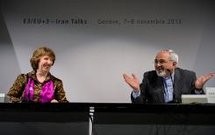 Marathon talks over Iran's nuclear program failed to reach a deal despite a mood of progress in Geneva on Nov. 9, setting the stage for another parley in 10 days.
Marathon talks over Iran's nuclear program failed to reach a deal despite a mood of progress in Geneva on Nov. 9, setting the stage for another parley in 10 days.
The lack of a conclusive deal in the historic talks between the so-called "P-5+1" -- the five permanent members of the U.N. Security Council plus Germany -- and Iran was cast by diplomats not as a failure but as a delay, with negotiations ending after midnight of their third day.
On the final day, there was intense deliberation in terms of bilateral, trilateral and multilateral meetings. The P-5+1 point person, EU foreign policy chief Catherine Ashton, and Iranian Foreign Minister Javad Zarif appeared jointly in a brief news conference. They appeared positive about the deliberations thus far and the next round of talks due to take place on Nov. 20-21 in Geneva.
As Stratfor pointed out Nov. 8, the deal may be reached only after further negotiations, but the process underway is irreversible. That the meeting wound into the early hours of a fourth day signals that talks have reached a final draft of the preliminary agreement negotiators were seeking. Leaks indicate that differences reportedly remain over the issue of suspending work at the heavy-water plutonium reactor in the Iranian city of Arak, as well as the disposition of Iran's stockpile of uranium that has already been enriched to 20 percent -- the level of purity regarded as just a few steps short of weapons-grade material.
Leaked reports in some media say the proposed deal would allow Iran to continue enriching uranium to 3.5 percent at all of its enrichment sites and place no limits on the number of centrifuges in Tehran's possession, currently estimated to be around 19,000. In addition, a significant easing of sanctions was also agreed upon, including the unfreezing of $3 billion of fuel funds, the rolling back of restrictions on Iran's petro-chemical and gold sectors, as well as a loosening of restrictions on the Iranian auto sector and replacement parts for planes.
While the Iranian team could not agree to the West's demands, it is also likely that their U.S. counterparts could not agree to the scale of sanctions reversal sought by Tehran. Notable was the role of French Foreign Minister Laurent Fabius, whose objections reportedly played a key role in preventing a deal from being reached.
In contrast to the French skepticism, the Iranian foreign minister and U.S. Secretary of State John Kerry were positive and upbeat in their brief remarks, saying that considerable progress had been made and would be built upon. Discussions have now reached the stage that negotiators from both sides need further authority from superiors on some details before inking an agreement. A deal is still nearly certain, but it will have to await a few more days of deliberation.
Courtesy : Stratfor (www.stratfor.com)